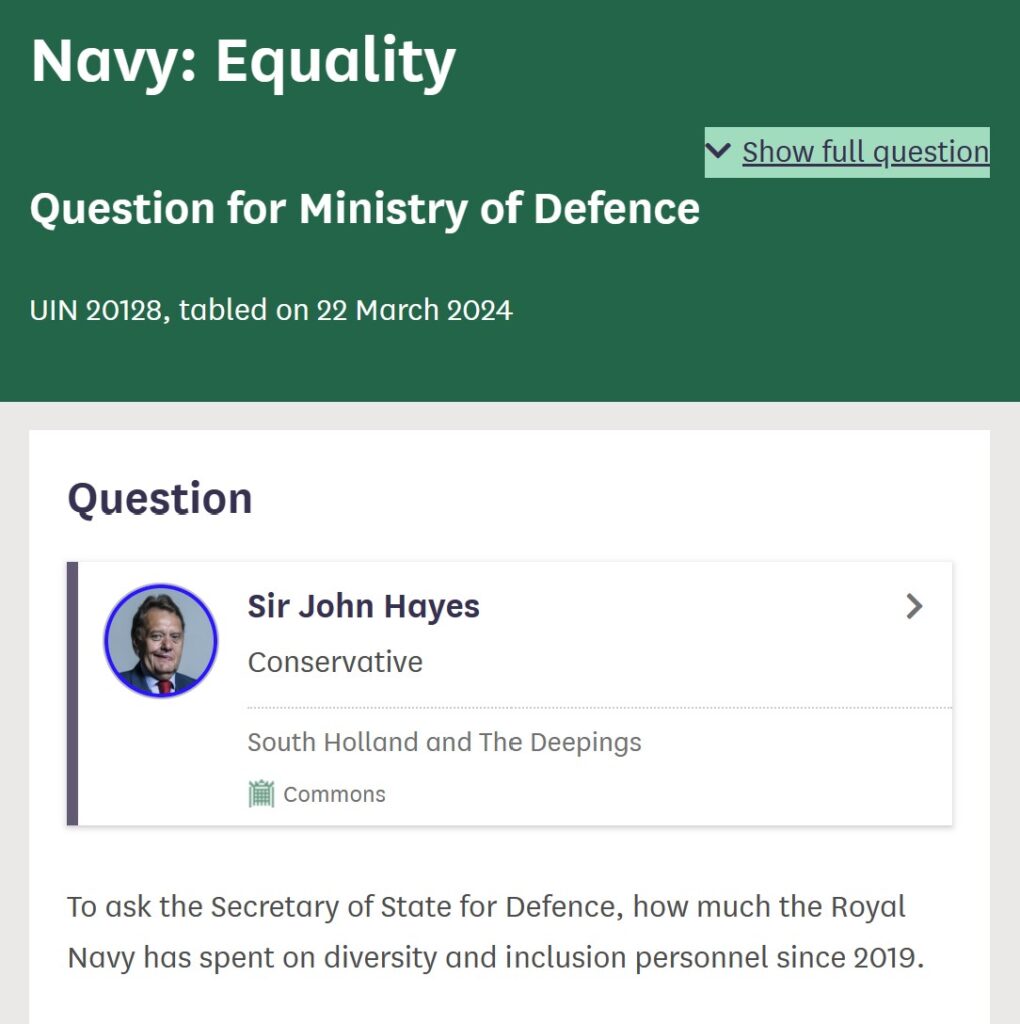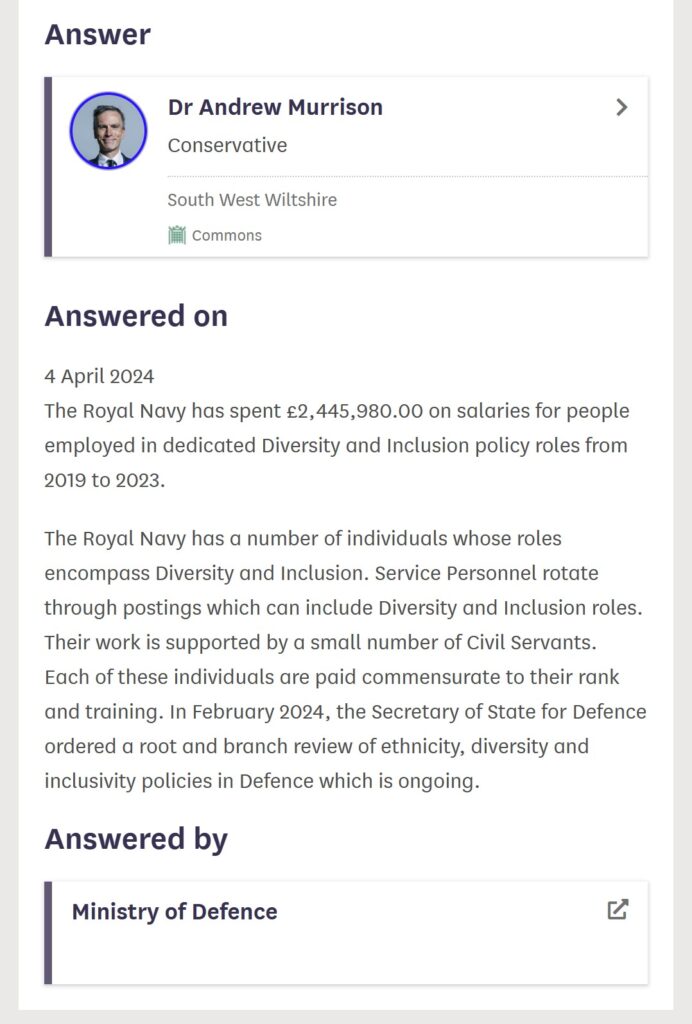The Royal Navy has splashed out £2.4million on dedicated diversity and inclusion staff in recent years, promoting a divisive political agenda at a time of heightened global tension, and when defence budgets are more constrained than ever, ministers have admitted (Express, Mail).
The spending was revealed through a parliamentary response from defence under-secretary Dr Andrew Murrison to Tory backbench MP Sir John Hayes, who asked how much the Royal Navy has spent on diversity and inclusion personnel since 2019.

“The Royal Navy has spent £2,445,980.00 on salaries for people employed in dedicated Diversity and Inclusion policy roles from 2019 to 2023,” Dr Murrison replied.
“The Royal Navy has a number of individuals whose roles encompass Diversity and Inclusion,” the under-secretary added. “Service Personnel rotate through postings which can include Diversity and Inclusion roles. Their work is supported by a small number of Civil Servants. Each of these individuals are paid commensurate to their rank and training.”

In February 2024 the Secretary of State for Defence, Grant Shapps, ordered a root and branch review of diversity and inclusivity policies in defence, which is ongoing.
Upon announcing the review, Mr Shapps told the Telegraph that precious resources were being “squandered to promote a political agenda which is pitting individuals against each other” at a time when the military faces a recruitment crisis and spending cuts.
“There is a woke culture that has seeped into public life over time and is poisoning the discourse,” he said, adding: “Anyone who questions it is dismissed out of hand. This extremist culture has crept in over years, and it is time for a proper shake-up, designed to refocus the military on its core mission – being a lethal fighting force… It is time for common sense instead of divisiveness.
As of February, the Navy had 15 people recruited in roles dedicated to diversity and inclusion, with another 13 in the Army and 14 in the RAF, with 10 other positions open for recruitment.
This isn’t the first time that the vogue for all things Critical Race Theory amongst the Navy’s top brass has hit the headlines.
Last August, the Express carried news of Navy HQ’s new ‘Divisional Officers and Troop Commanders Briefing Notes’, courtesy of a tip-off from the FSU.
The Briefing Notes, which were leaked to us by a concerned employee, urge officers to “routinely share” their chosen pronouns, suggesting this could be an “act of allyship”, while also advising officers to avoid saying “good morning, guys”, instead of using the gender neutral ‘everyone’ or ‘team’.
Elsewhere, the document explains the importance of a concept drawn from Critical Race Theory: ‘lived experience’, that great incontestable of the woke age, in which the engagement with day-to-day life of certain pre-identified groups is filtered through a script of systemic oppression.
Navy officers are told they need to understand how race, class, gender and other badges of victimhood impact on a person’s identity and “to recognise and appreciate the lived experience” of the oppressed guys in their team.
“Before you voice your opinion on another person,” officers in command of sailors aboard commissioned ships operating in fast-paced, high-risk environments are told, “you should stop to think about whether you have the right to speak about them from a position of no direct expertise and consider whether your behaviour is contributing to or alleviating their existing disadvantage.”
As if the image thus conjured of Blighty’s new generation of nerveless, amphibious killing machines wasn’t already enough to fill the hearts of Vladmir Putin’s inner circle with terror, the Briefing Notes go on to address the issue of ‘white privilege’, and how it impacts Navy officer themselves, the vast majority of whom are white males.
“The term ‘white privilege’ has been talked about in the context of the Black Lives Matter protests,” the document says, adding: “It refers to the idea that skin colour can affect your lived experience such that it can either give you an advantage or be a barrier to almost all areas of life.
“Therefore, if you are ‘white’, whatever situation you are in, it is almost always the case that the outcome has not been affected by your skin colour” – a statement that will no doubt one day be of great comfort to the Captain of a lone British frigate locked in a tense stand-off with a fleet of Chinese warships as they begin manoeuvring themselves into an attack formation a few miles off the disputed Spratly and Paracel Islands in the South China Sea.
Is this a free speech issue? We think it is.
As FSU Director of Data and Impact Tom Harris points out in our latest research briefing, The EDI Tax, diversity and inclusion training initiatives of this kind may well be intended to make workplaces more inclusive, attractive places to work, particularly for members of historically disadvantaged groups – but according to a representative survey of British workers conducted on our behalf, it’s having the opposite effect.
As Tom points out, many ambitious employees and senior managers are leaving organisations because of the excessive time they’re expected to spend on these courses and, ironically, they are proving most irksome to those they purport to benefit, i.e. members of the LGBTQ+ community and ethnic minorities. Given the extent of self-censorship revealed by our research, many UK employees are thinking twice before contributing to workplace conversations. Genuine diversity of thought is required for any business to thrive, but much diversity and inclusion training is having the opposite effect and embedding a new form of groupthink
The findings from this briefing are consistent with the report of the Inclusion at Work panel commissioned by the UK’s Minister for Women and Equalities, Kemi Badenoch. Following interviews with 100 people representing 55 organisations, the report noted a “lack of accessible, plain-language, robust data on the efficacy of D&I [Diversity & Inclusion] interventions”, as well as a lack of evidence that these interventions were effective in achieving their purported objectives.
In December 2020, the government’s Behavioural Insights Team came to a similar conclusion in its review of unconscious bias training. The Written Ministerial Statement accompanying that study noted that: “Despite a growing diversity training industry and increased adoption of unconscious bias programmes, a strong body of evidence has emerged that shows that such training has no sustained impact on behaviour and may even be counter-productive.”






